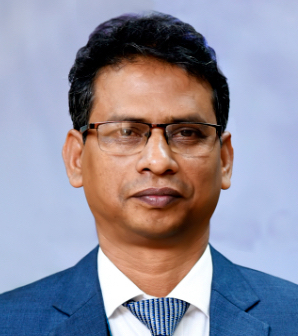 Md. Bayazid Sarker
Md. Bayazid Sarker
Deputy General Manager
Bangladesh Bank
Transition Economy Program (’10)
Please tell us about your career path so far. What is your area of specialization and how did you come to work in this area?
After finishing my Masters in Economics from the University of Dhaka, I worked in several research organizations, including the state-run Bangladesh Institute of Development Studies (BIDS), during 1997-98. In March 1999, I joined Bangladesh Bank (BB), the central bank of Bangladesh. Currently I work in the Foreign Exchange Policy Department (FEPD) of the Bangladesh Bank as a Deputy General Manager (DGM). Before assuming my current role, I have worked in various areas of Bangladesh Bank, including public debt management, risk management, banking regulation and policy research. During the early years of my central banking career, I worked in FEPD for 5 years (2002-06). Working in FEPD made me enthusiastic about research on international economics.
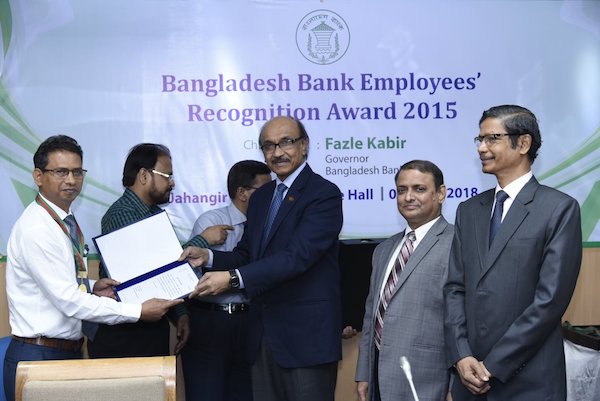
Sarker receiving a Gold Medal, the highest performance award of Bangladesh Bank, for developing the idea of migrants’ sponsored banking (NRB banks) system (2015)
Feeling the necessity of the country to form capital and to ensure the best utilization of resources available, I developed a research paper in 2007 where I recommended a new banking idea: a bank solely sponsored by expatriates. Based on the research recommendation, Bangladesh Bank gave licenses to three Non-resident Bangladeshis (NRB) banks in 2012. After spending years in policy research, I have returned to FEPD as a Deputy General Manager (DGM).
You are currently serving as Deputy General Manager of Bangladesh Bank. What are your main roles and responsibilities?
Basically, off-site supervision of the foreign exchange market in Bangladesh is my domain. This encompasses detailing policies for offshore banking units and special economic zones, watching market movements through open position and transaction reconciliation of authorized dealer banks, working with IMF and other development partners for capital account openness, assisting rating agencies for conducting sovereign credit rating of the country, and making policies for derivative products in the local market, among others.
In your current capacity, what do you see as the main opportunities and challenges for Bangladesh over the course of the next five to ten years?
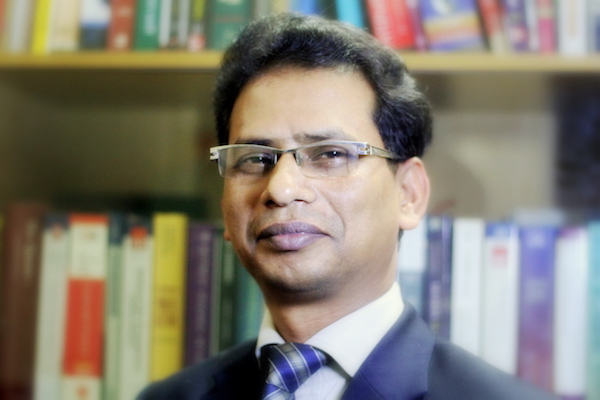 Regarding opportunities, Bangladesh is in strong growth momentum maintaining continuous, high and stable growth with a bearable price level pressure, below 5 percent fiscal deficit, stable exchange rate and favorable external debt dynamics that ultimately support gradual openness and expansion of our external sector. This macroeconomic stability is mainly driven by demographic dividend through remittance inflows, maintaining competence in garments export and similar progress in the agriculture and service sectors.
Regarding opportunities, Bangladesh is in strong growth momentum maintaining continuous, high and stable growth with a bearable price level pressure, below 5 percent fiscal deficit, stable exchange rate and favorable external debt dynamics that ultimately support gradual openness and expansion of our external sector. This macroeconomic stability is mainly driven by demographic dividend through remittance inflows, maintaining competence in garments export and similar progress in the agriculture and service sectors.
At the same time, a lower pace of institutional development may impede the present and potential economic growth trend. In addition, the recent negative external balance may not be sheltered by a higher investment share of GDP, as the portion of investment to the infrastructure is below 1 percent, much lower than the expected level and these may pose a serious challenge to further economic development.
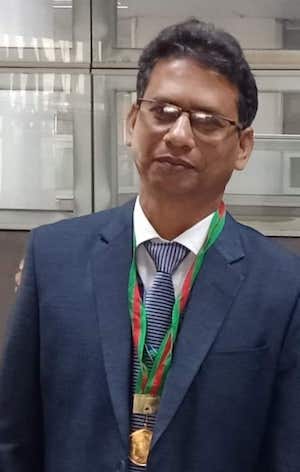
Sarker proudly showing his Gold Medal Employee Recognition Award in 2015
What are some of the biggest challenges you face in your work? And what have been the most interesting or rewarding aspects of your career thus far?
I am very keen to contribute to policy issues conducive to the economic development of Bangladesh, though limited institutional support often makes it challenging. Inadequate pro-innovative policy is another challenging issue in my sphere of works. On the other hand, recognition from Wikipedia (https://en.m.wikipedia.org/wiki/NRB_Bank), Bangladesh Economic Association (2017), and Bangladesh Bank (Employee Recognition Award-2015, Gold Medal, declared in 2018) regarding my concept of banks sponsored by expatriates have been the most inspiring rewards in my career so far.
What led you to GRIPS? What is the most important thing you got out of your studies here, and how has your experience at GRIPS prepared you for future endeavours?
I think the fact that GRIPS is unique in policy studies for developing economies and a platform for potential world leaders led me to prefer GRIPS in my higher study decision planning. Beside the academic activities, we could enrich ourselves by sharing knowledge and experiences with other classmates who were valued mid-level policy makers from more than 50 countries. Learning lessons from GRIPS especially research techniques have inspired me to engage in further forward-looking policy work.
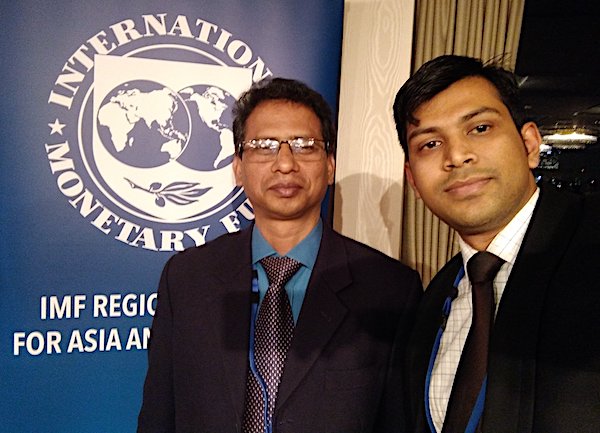
At JISPA Continuing Education Program in Tokyo and Kobe, with colleague (and GRIPS fellow), Mohammad Tareq Kibria, March 2018
Have you had any involvement, professional or otherwise, with Japan since your graduation?
I had a chance to participate in the IMF-sponsored JISPA Continuing Education program in March 2018 in Tokyo and Kobe and in the Japan-IMF Macroeconomic Seminar in March 2019 at GRIPS. Both programs have helped me keep updating my knowledge on international economics. Of course, the aftermath of those courses will be reflected in my next research and professional endeavors.
How do you maintain a balance between your work and the rest of your life? And what is your favorite thing to do when you are not working?
In fact, lessons of time management from Japan have helped me to balance my daily life. I am also grateful to my lovely wife for playing a key role in balancing, overlapping and separating working time and leisure time. But in a sense I am always working. During the days off and weekends, I often work with local job seekers to motivate them.
What are some of your fondest memories of your time spent at GRIPS? And what do you miss about Japan?
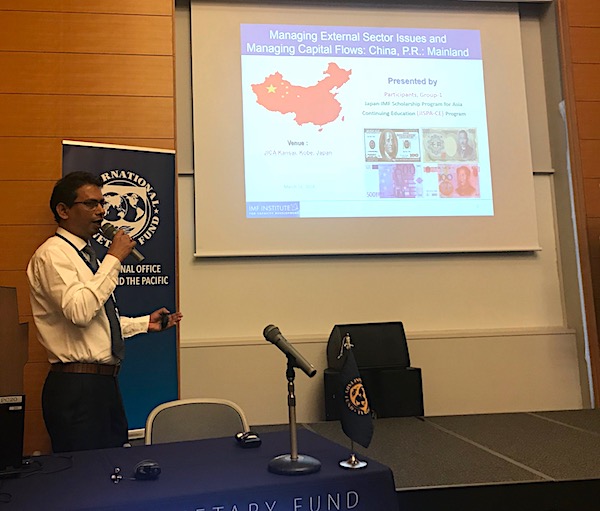
Presenting at JISPA Continuing Education Program in Tokyo and Kobe, March 2018
Living in the Tokyo International Exchange Center (TIEC) in Odaiba with its multicultural environment, study tours, and my family’s company in the last month of my stay in Tokyo are pieces of sweet memories about life in GRIPS. I miss Japan in all its aspects, be it lifestyle, food, sakura and the people.
If you could give one piece of advice to anyone considering studying at GRIPS what would it be?
GRIPS has planned and arranged its curriculum, academic activities and accommodation in such a way that a student can learn all day long and for the whole duration. Especially, I recommend all present and potential students to maximize their learning and experience by using the platform of excellence that GRIPS has made only for them.
How would you like to maintain involved with the School? What do you expect from GRIPS as an alumnus and do you have any suggestions on how to further utilize the GRIPS alumni network?
GRIPS should arrange more short courses on changing and potentially important issues for its alumni. In this way GRIPS can keep updating itself along with its alumni.





